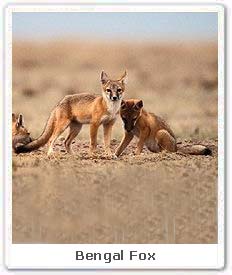| Kingdom : | Animalia |
| Phylum : | Chordata |
| Class: | Mammalia |
| Order : | Carnivora |
| Family : | Canidae |
| Genus : | Vulpes |
| Species : | V . Bengalensis |
| Zoological name : | Vulpes bengalensis |
| Found In | Bandhavgarh, Bandipur and Sundarbans National Park in India |
 Physical appearance : Bengal Fox is a medium size fox.
The colour of their coat is buff orange with paler underparts and black tip
on its tail. It has reddish brown fur. Their head and body length is 45- 60
cm and weigh around 3- 4 kg. Tail length is 25 -30 cm. They have long sharp
pointed canines and well developed molar teeth. Bengal Fox has relatively
long ears. It has brown legs and black lips.
Physical appearance : Bengal Fox is a medium size fox.
The colour of their coat is buff orange with paler underparts and black tip
on its tail. It has reddish brown fur. Their head and body length is 45- 60
cm and weigh around 3- 4 kg. Tail length is 25 -30 cm. They have long sharp
pointed canines and well developed molar teeth. Bengal Fox has relatively
long ears. It has brown legs and black lips.Presence in India : Bengal Fox is found in the foot hills of the Himlayas and the southern parts of India. It is also spotted in the Bandhavgarh, Bandipur and Sundarban national Park.
Habitat : The Bengal Fox inhabits semi arid regions, thorny shrubs, open grasslands, forests, mountains and near human settlements.
Diet : The Bengal fox feeds on insects, reptiles, birds, eggs, crabs, termites, fruit, melons and small mammals.
Subspecies :There is no subspecies of the Bengal Fox.
Reproduction :The gestation period lasts for 51- 53 days. Females give birth to 3-6 cubs, which weigh 50 – 100 g. Mating season of the Bengal Fox is not known. They usually live in pairs but hunt alone.
Conservation status : Least Concern. People haunt Bengal Fox for its flesh and skin. They are also haunted for sports. Its body parts are used in the traditional medicines. Loss of its grassland habitat has seriously declined its population on Earth.
Lifespan : Life expectancy of the Bengal fox is up to 10 years or more.






